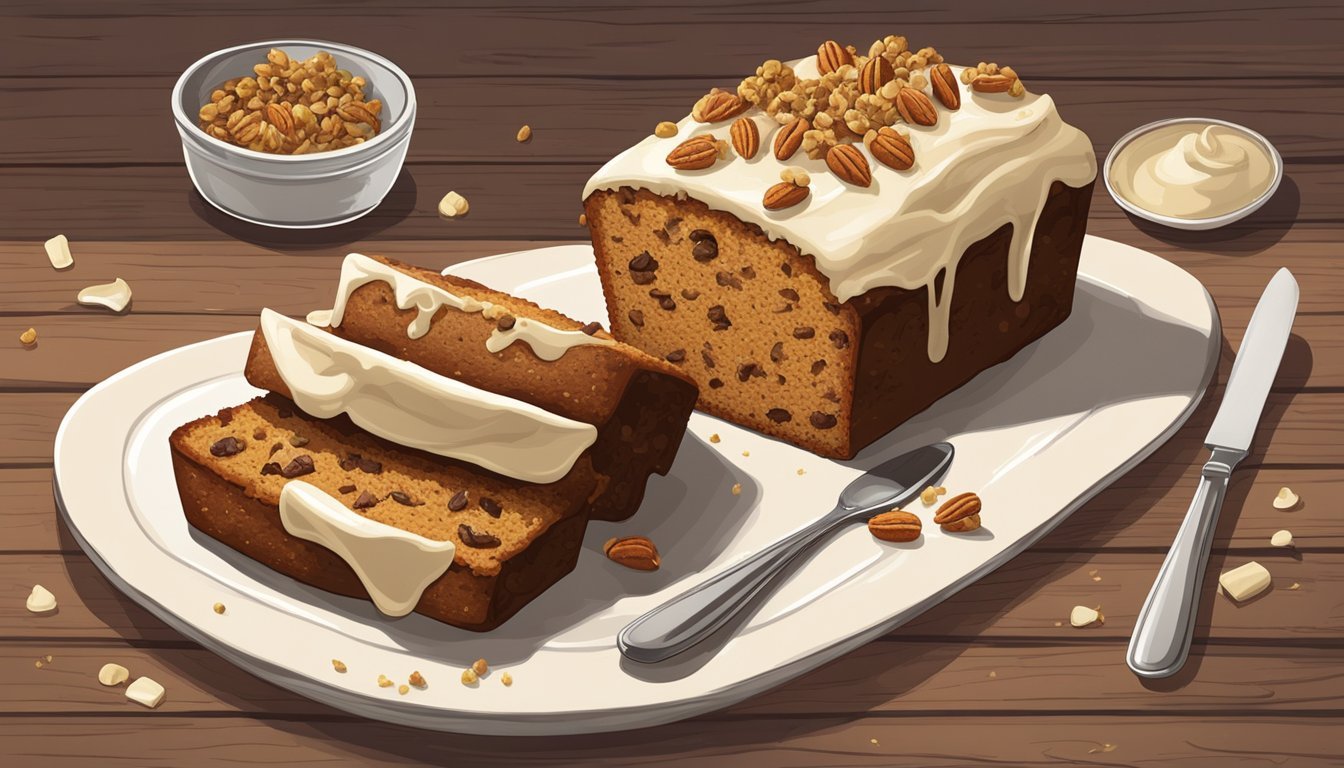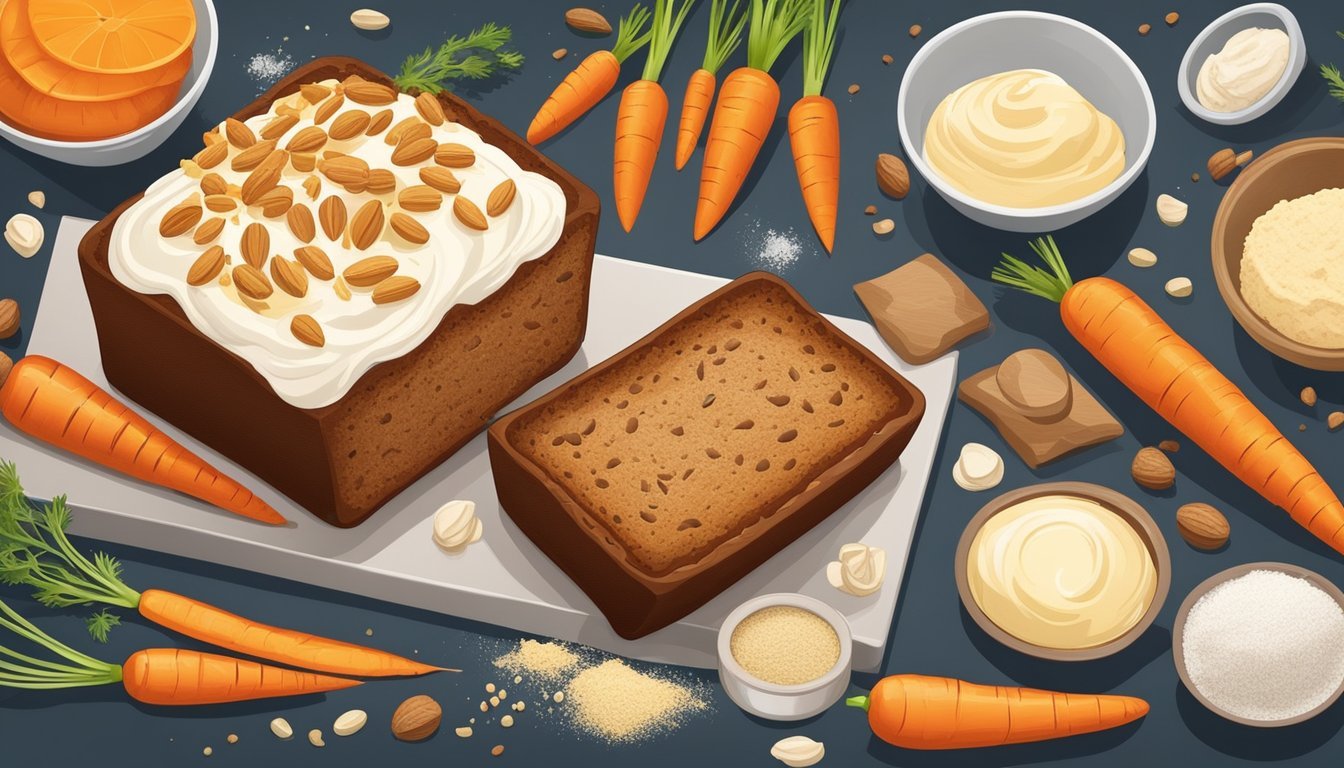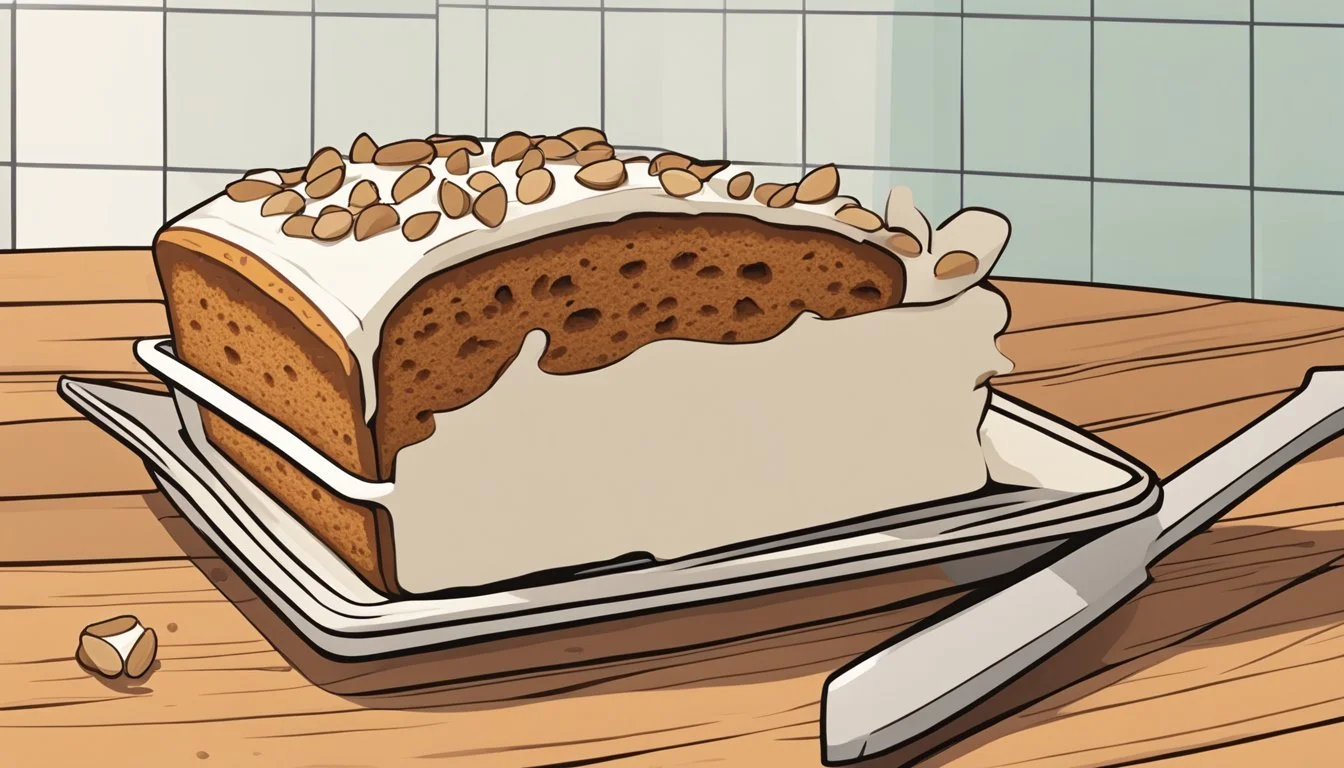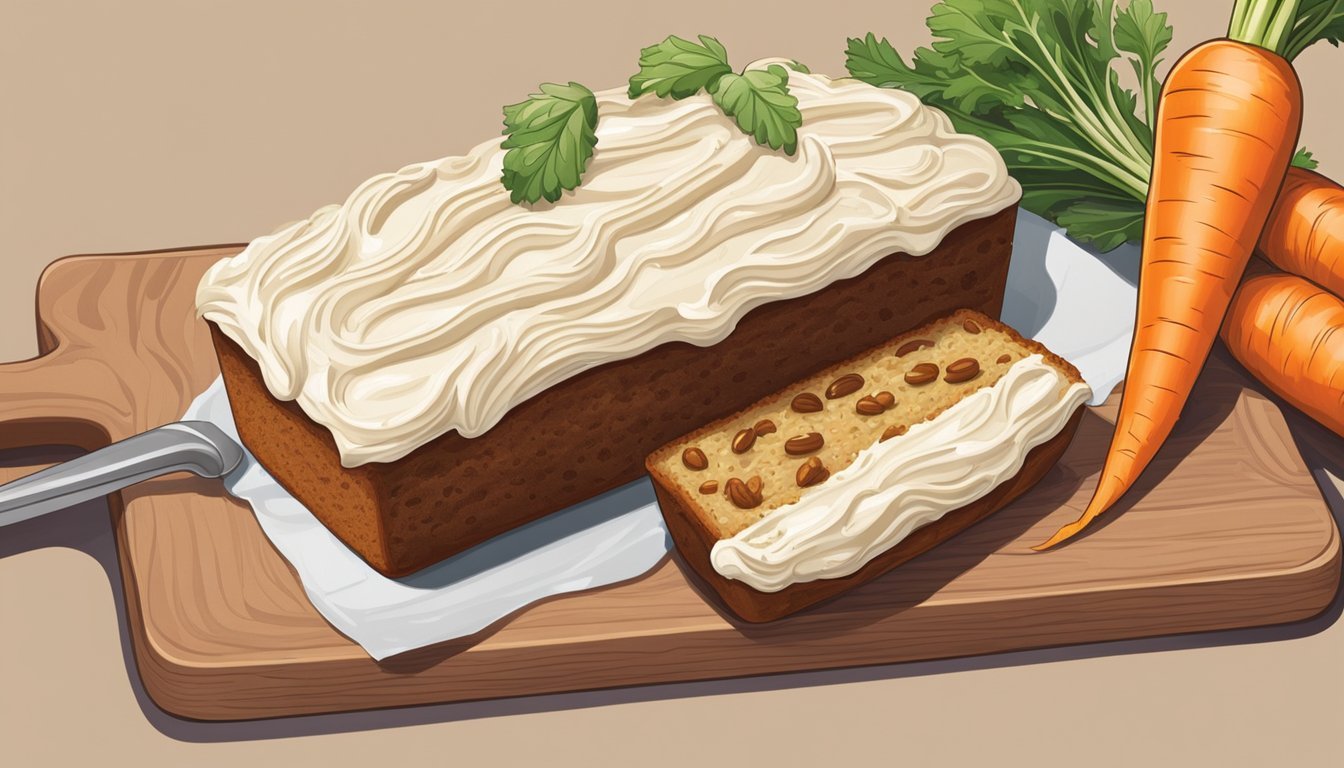Carrot Cake Loaf
Carrot cake loaf is a delightful twist on the traditional carrot cake, which offers the same delicious flavors and moist texture in an easy-to-make loaf form. Perfect for dessert or a morning treat, this baked good is characterized by its marriage of simple ingredients like grated carrots (how long do carrots last?), brown sugar, and a blend of spices. With its appealing balance of sweetness and spice, carrot cake loaf is a versatile, crowd-pleasing addition to any dessert menu or sweet treat repertoire.
To create a tempting carrot cake loaf, bakers start by combining dry ingredients like all-purpose flour, baking powder, and a medley of spices such as cinnamon, nutmeg, and ginger in a medium bowl. Separately, the wet ingredients—typically a mixture of granulated sugar or coconut sugar, vegetable or olive oil, and pre-shredded or grated carrots—are prepared. Then, the dry and wet mixtures are combined, folded together, and poured into a parchment paper-lined loaf pan.
Baking times vary, but once the prepared loaf is finished, the carrot cake loaf should cool on a wire rack before being adorned with that iconic cream (how long does cream last?) cheese frosting or icing. This scrumptious glaze lends an extra layer of decadence to the finished product, ensuring each slice boasts an unforgettable combination of moist, spiced bread (how long does bread last?) and luscious cream.
Ingredients and Alternatives
Carrot Cake Essentials
The following are essential ingredients for making a delicious and moist Carrot Cake Loaf:
All-purpose flour: The base for the cake.
Baking powder: Provides the necessary lift for the bread.
Eggs: Help bind ingredients together and contribute to the bread's structure.
Carrots: The star ingredient, either grated or shredded for the best texture.
Cinnamon, nutmeg, and ginger: These spices add warmth and flavor to the carrot cake.
Sugar: Both brown and granulated sugars can be used; the former adds more moisture and a richer flavor.
Salt: Enhances the flavors of the other ingredients.
Vegetable oil or butter: Provides moistness to the cake. Vegetable oil creates a more tender crumb, while butter imparts a richer flavor.
Vanilla extract: Enhances the overall taste of the cake.
Walnuts or pecans: Adding a bit of crunch to complement the moist cake.
Cream cheese: (how long does cream cheese last?) The base for the icing, which adds tanginess and a creamy texture.
Substitutions and Variations
It's possible to modify the Carrot Cake Loaf recipe to accommodate personal preferences or dietary restrictions. Here are some substitutions and variations:
Gluten-free: Substitute all-purpose flour with a gluten-free blend.
Dairy-free: Replace butter with additional vegetable oil or a dairy-free alternative, and use a dairy-free cream cheese substitute for the icing.
Vegan: Use flax eggs (1 tbsp ground flaxseed + 3 tbsp water per egg) and dairy-free substitutes for butter and cream cheese.
Additional spices: Add a touch of cloves or allspice for a more complex flavor profile.
Fruits: Include raisins or other dried fruits for a twist of fruity flavor.
Sweeteners: Use maple syrup or honey as an alternative to granulated sugar; adjust the liquids accordingly.
By considering these ingredients and alternatives, you can create a carrot cake loaf that caters to various tastes and dietary needs while maintaining its delicious flavor and moist texture.
Preparation Guide
Preparing the Batter
To begin creating your carrot cake loaf, firstly gather all the necessary ingredients. These typically include all-purpose flour, baking powder, baking soda, salt, cinnamon, ground ginger, nutmeg, brown sugar, and grated carrots. You'll also need eggs, vegetable oil (or a substitute like coconut or olive oil), and vanilla extract for the wet ingredients.
In a medium mixing bowl, whisk together the dry ingredients—flour, baking powder, baking soda, salt, cinnamon, ginger, and nutmeg—until well combined. In another bowl, mix the wet ingredients like eggs, oil, and vanilla extract. Gradually add the dry ingredients to the wet until fully combined. Finally, fold in your freshly grated carrots.
Important tips:
Use a food processor or a box grater to grate the carrots into smaller pieces.
Always use parchment paper to line the loaf pan for easy removal.
Baking the Loaf
Before you start, preheat your oven to 350°F (180°C) and grease a 9×5-inch loaf pan. Line it with parchment paper, allowing excess paper to hang over the edges for easy removal later on.
Pour the prepared carrot cake batter into the loaf pan and smooth the surface with a spatula. Place the pan into the preheated oven and bake for 50-60 minutes. The exact baking time may vary depending on your oven, so it's crucial to check for doneness with a toothpick or skewer. If it comes out clean or with only a few moist crumbs, the loaf is done.
Once the loaf is baked, remove it from the oven and let it cool in the pan for about 10-15 minutes. Then, using the parchment paper overhang, carefully lift the loaf from the pan and transfer it to a wire rack to cool completely.
While the carrot cake loaf cools, you can prepare a delicious cream cheese frosting. In a medium bowl, use an electric mixer to combine cream cheese, unsalted butter, powdered sugar, and a teaspoon of vanilla extract. If the frosting is too thick, you may add a tablespoon or two of milk to thin it out.
When the loaf has entirely cooled, spread the cream cheese frosting evenly over the top and serve. Enjoy your homemade carrot cake loaf with your favorite warm beverage or as a delightful dessert.
Frosting and Toppings
Frosting with Cream Cheese Delight
One of the most popular and delicious frostings for a carrot cake loaf is cream cheese frosting. To make this frosting, combine 8 ounces of cream cheese (at room temperature), 1/2 cup of unsalted butter (also at room temperature), 1 teaspoon vanilla extract, and a pinch of salt in a mixing bowl. Using an electric mixer, beat the ingredients together until smooth and creamy. Gradually add 2-3 cups of powdered sugar (based on desired sweetness), and mix until the frosting has a thick, spreadable consistency.
Once your carrot cake loaf has cooled, generously spread the cream cheese frosting on top. Allow it to set for a few minutes before slicing and serving the cake.
Adding Nuts and Spices
For extra texture and flavor, consider adding nuts and spices to your carrot cake loaf. Classics like chopped pecans or chopped walnuts can be mixed into the batter or sprinkled on top of the frosting for a crunchy finish. Some bakers also like to include raisins in the cake for added moisture.
In addition to the basic ground cinnamon typically found in carrot cake recipes, you can also experiment with other spices to enhance the taste. A combination of 1/2 teaspoon of ground ginger, 1/4 teaspoon ground nutmeg, and 1/4 teaspoon ground cloves can complement the original cinnamon flavor, adding depth and warmth to the dessert.
To bake the carrot cake loaf, combine the dry ingredients, such as 2 cups all-purpose flour, 1 teaspoon baking powder, and 1/2 teaspoon baking soda, in a medium bowl. In another bowl, mix the wet ingredients, like 1 cup brown sugar, 1 cup grated carrots, and 1/2 cup vegetable oil. Slowly incorporate the dry ingredients into the wet mixture, folding in any additional nuts, spices, or raisins as desired. Pour the batter into a prepared loaf pan lined with parchment paper, and bake for about 50-60 minutes in a preheated 350°F (175°C) oven. Allow the loaf to cool on a wire rack before adding the frosting and toppings. With these carefully chosen enhancements, your carrot cake loaf will be a perfect blend of flavors and textures, satisfying every palate.
Serving and Preservation
Presentation Tips
Carrot cake loaf is a versatile and delicious treat that can be enjoyed for breakfast or dessert. When serving carrot cake loaf, there are some presentation tips to make it more appealing:
Slice neatly: Use a serrated knife to create even slices that highlight the moist texture and grated carrots in the loaf.
Add icing: A drizzle of cream cheese icing, made from cream cheese, powdered sugar, milk, and a pinch of salt, can be added on top for a touch of sweetness. Alternatively, you can create a glaze with icing sugar and milk for a lighter option.
Garnish: Sprinkle some raisins, pecans, or finely grated carrot to add a pop of color and extra flavor to your carrot cake loaf.
Storing for Freshness
To maintain the freshness and flavor of carrot cake loaf for an extended period, proper storage is essential. Follow these steps to store your carrot cake loaf properly:
Cooling: Allow the carrot cake loaf to cool completely on a wire rack before storing. This step prevents the loaf from becoming soggy due to trapped heat and moisture.
Containers: Store the carrot cake loaf in an airtight container, or wrap it in aluminum foil or plastic wrap to seal in moisture and extend the shelf life.
Parchment Paper: If storing multiple layers or slices of carrot cake loaf, insert parchment paper between the slices to prevent them from sticking together.
Temperature: Keep the carrot cake loaf at room temperature for up to 3 days, or refrigerate for up to 1 week.
Freezing: To store your carrot cake loaf for up to 3 months, wrap it tightly in parchment paper or aluminum foil, place it in a zip-top bag or airtight container, and freeze. Thaw the loaf at room temperature or in the refrigerator before serving.
Icing and garnishing: It is best to add icing and garnishes right before serving as they may not hold up well during storage.
By following these serving tips and storage guidelines, you can enjoy a flavorful and moist carrot cake loaf every time. Remember to use quality ingredients, such as freshly grated carrots, brown sugar, vegetable oil, and a mix of baking powder and baking soda, for optimal results.
Nutritional Information
Carrot cake loaf is a delicious treat that combines the natural sweetness of carrots with a variety of spices and simple ingredients. The key to its moist and sweet texture lies in the combination of grated carrots, brown sugar, and the right balance of wet and dry ingredients.
On average, a slice of carrot cake loaf contains around 326 calories, with approximately 16.7g of total fat, 3.081g of saturated fat, 42.37g of carbohydrates, and 0.9g of dietary fiber1. The sugar content in a carrot cake loaf primarily comes from the brown sugar, with about 31.3g per serving. Be mindful of the portion size when enjoying this treat, as it can be quite rich.
For the dry ingredients, combine all-purpose flour, baking powder, baking soda, and various spices like ground cinnamon, ground ginger, and ground nutmeg in a medium bowl. The wet ingredients usually include olive oil or vegetable oil, as well as eggs and the grated carrots. Some recipes may call for the use of coconut sugar as a healthier alternative to brown sugar.
To prepare the carrot cake loaf, simply mix the dry and wet ingredients together and pour the batter into a parchment paper-lined loaf pan. Bake the loaf for roughly 1 hour or until a toothpick inserted in the center comes out clean. Let it cool on a wire rack before adding any desired toppings, such as cream cheese frosting.
The cream cheese frosting can be made by combining cream cheese, unsalted butter, powdered sugar, and a teaspoon of vanilla extract with an electric mixer. This adds an extra layer of sweetness to the carrot cake loaf, though it can be enjoyed plain as well.
Carrot cake loaf can be customized with various additional ingredients, like raisins, pecans, or even coconut flakes, to suit personal preferences. With its moist texture, rich flavor, and simple preparation, it is no wonder that carrot cake loaf has become a popular choice for both everyday snacking and special occasions.
Footnotes
Calories and nutritional information based on search results. ↩
Expert Baking Tips
Achieving the Perfect Texture
To achieve the perfect moist and delicious carrot cake loaf texture, follow these tips:
Combine wet and dry ingredients separately: Use a medium bowl to mix all the dry ingredients like all-purpose flour, baking powder, baking soda, and spices. In another bowl, mix the wet ingredients such as large eggs, vegetable oil, and grated carrots.
Add sugar to wet ingredients: Opt for brown sugar as it helps retain moisture better than granulated or coconut sugar. This will result in a super moist carrot loaf.
Grate fresh carrots: Avoid using pre-shredded carrots; instead, grate fresh carrots to ensure better moisture and flavor. For a standard size loaf, you'll need about 2 cups of grated carrots.
Use room temperature eggs: Let your large eggs come to room temperature to ensure a well-combined batter for a better-textured carrot cake.
Common Mistakes and Solutions
Keep these common mistakes in mind to avoid unwanted surprises in your carrot cake loaf:
Wrong baking time: Check your carrot cake loaf 5-10 minutes before the mentioned baking time is over to prevent overcooking or browning. The cake is ready when a toothpick inserted in the center comes out clean.
Using too much oil: To maintain the right balance of moisture, stick to around 1/3 cup of vegetable oil or olive oil instead of increasing it. Too much oil could lead to a dense loaf.
Skipping spices: Don't skimp on spices such as cinnamon, nutmeg, and ground ginger. They enhance the flavor and aroma of the carrot cake loaf.
Overmixing the batter: When combining the wet and dry ingredients, mix gently, using a spatula, until the batter is just combined. Overmixing can result in a dense and tough cake.
Not using parchment paper: Line your 9"x5" loaf pan with parchment paper or grease it to avoid the loaf sticking to the pan and crumbling while removing.
Not cooling the cake properly: Allow the carrot cake loaf to cool in the pan on a wire rack for at least 10 minutes before removing it. This will help retain its shape and make it easy to handle.
Remember these expert baking tips, and you'll be on your way to making a carrot cake loaf that your friends and family will love.







